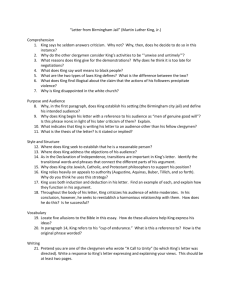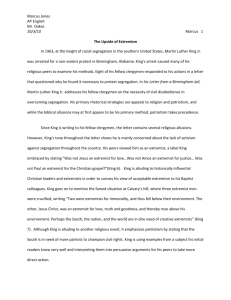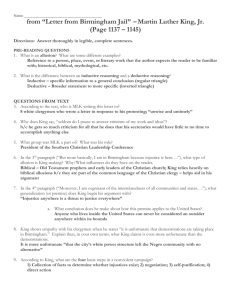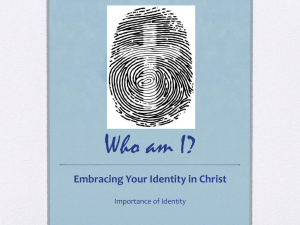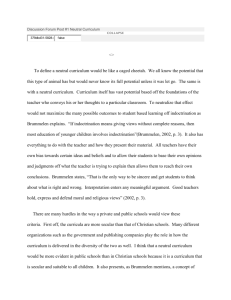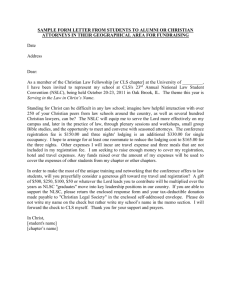Extremists for Love: Religious Allusions in Martin Luther King Jr.
advertisement
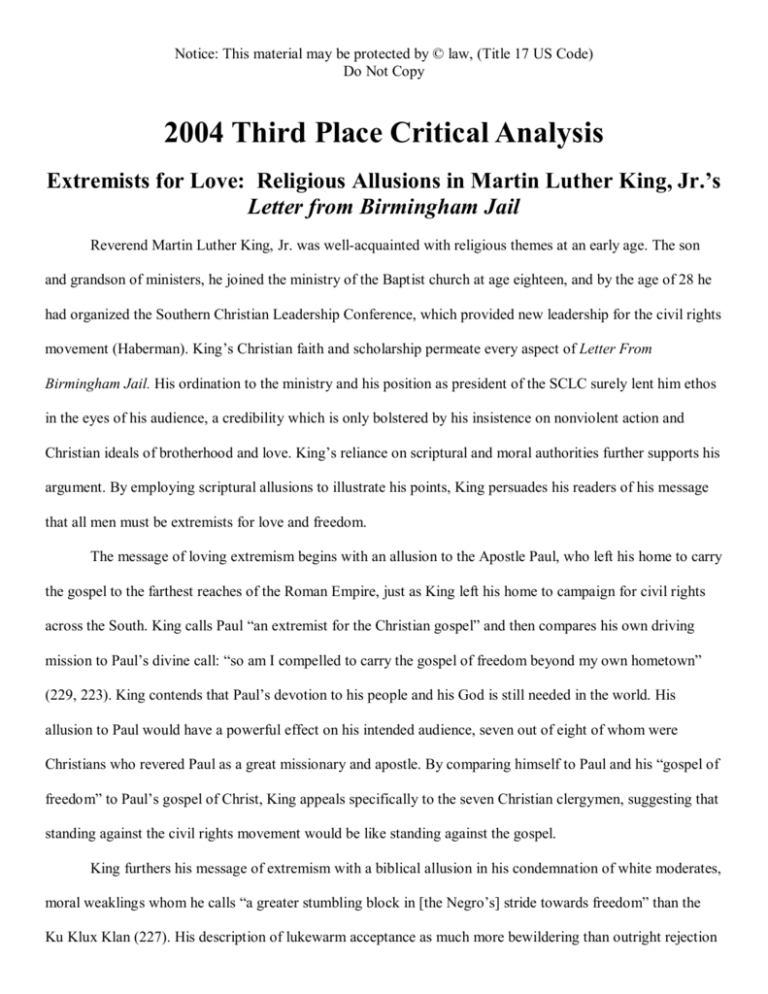
Notice: This material may be protected by © law, (Title 17 US Code) Do Not Copy 2004 Third Place Critical Analysis Extremists for Love: Religious Allusions in Martin Luther King, Jr.’s Letter from Birmingham Jail Reverend Martin Luther King, Jr. was well-acquainted with religious themes at an early age. The son and grandson of ministers, he joined the ministry of the Baptist church at age eighteen, and by the age of 28 he had organized the Southern Christian Leadership Conference, which provided new leadership for the civil rights movement (Haberman). King’s Christian faith and scholarship permeate every aspect of Letter From Birmingham Jail. His ordination to the ministry and his position as president of the SCLC surely lent him ethos in the eyes of his audience, a credibility which is only bolstered by his insistence on nonviolent action and Christian ideals of brotherhood and love. King’s reliance on scriptural and moral authorities further supports his argument. By employing scriptural allusions to illustrate his points, King persuades his readers of his message that all men must be extremists for love and freedom. The message of loving extremism begins with an allusion to the Apostle Paul, who left his home to carry the gospel to the farthest reaches of the Roman Empire, just as King left his home to campaign for civil rights across the South. King calls Paul “an extremist for the Christian gospel” and then compares his own driving mission to Paul’s divine call: “so am I compelled to carry the gospel of freedom beyond my own hometown” (229, 223). King contends that Paul’s devotion to his people and his God is still needed in the world. His allusion to Paul would have a powerful effect on his intended audience, seven out of eight of whom were Christians who revered Paul as a great missionary and apostle. By comparing himself to Paul and his “gospel of freedom” to Paul’s gospel of Christ, King appeals specifically to the seven Christian clergymen, suggesting that standing against the civil rights movement would be like standing against the gospel. King furthers his message of extremism with a biblical allusion in his condemnation of white moderates, moral weaklings whom he calls “a greater stumbling block in [the Negro’s] stride towards freedom” than the Ku Klux Klan (227). His description of lukewarm acceptance as much more bewildering than outright rejection calls to mind the Lord’s condemnation of the Laodiceans: “Because thou art lukewarm, and neither cold nor hot, I will spue thee out of my mouth” (Revelation 3:16). That is, there can be no fence-sitting in a conflict of religion—or of freedom. King’s “lukewarm” allusion is a pointed reminder to his readers that in some things a man must be an extremist. He must serve either God or the devil; he must choose either freedom or bondage. Finally, King alludes to Jesus Christ as the ultimate example of loving extremism. “Was not Jesus an extremist for love?” he demands (King 229). His own policy of nonviolent action is no more extreme than Christ’s commandment to love one’s enemies. Christ, King argues, was “an extremist for love, truth, and goodness, and thereby rose above his environment… [T]he South, the nation, and the world are in dire need of creative extremists” (230). By holding up the Savior of the world as an example of righteous extremism, King solidifies his message, for surely his Christian audience remembers that Christ commanded his disciples to do as he did (John 13:15). If the clergymen consider themselves truly Christian, King implies, then they will follow Christ by extending the hand of love, fellowship, and equality to all men. The eight Alabama clergymen who issued the public statement on 12 April 1963 condemn Martin Luther King, Jr.’s demonstrations in Birmingham as “extreme” (Carpenter et al.). King’s reply masterfully turns that argument against them, using biblical allusions to prove that in some things all men must take a stand. By appealing to authorities revered as scripture by these clergymen, King strengthens his persuasive message that all moral and decent people must be extremists for love and freedom. Works Cited Carpenter, C.C.J., J.A. Durick, M.L. Grafman, P. Hardin, N.B. Harmon, G.M. Murray, E.V. Ramage, and E. Stallings. “Public Statement by Eight Alabama Clergymen.” The Birmingham News 12 April 1963. Haberman, F. W. “Martin Luther King—Biography.” Nobel Lectures, Peace 1951-1970. 29 April 2004. The Nobel Institute. 30 September 2004. <http://www.nobelprize.org/peace/laureates/1964/king-bio.html.> King, M. L., Jr. “Letter from Birmingham Jail.” 28 August 1963. Readings for Intensive Writers. Ed. S. T. Lang. Boston: Pearson Custom Publishing, 2002. 222-233.

